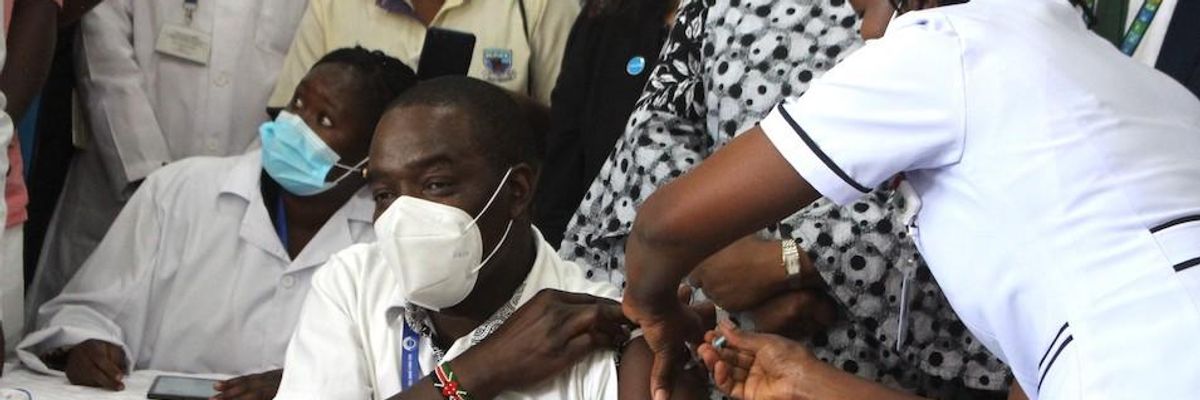Kenya has sharply criticized the United Kingdom for eschewing "solidarity and collaborative partnership" in the fight against the global Covid-19 pandemic by instituting a "discriminatory" travel ban and accused the nation of carrying out "vaccine apartheid."
The criticism came in a Saturday statement (pdf) from Kenya's Foreign Ministry. It was released a day after the U.K. government's Department for Transport added Kenya--as well as the Philippines, Pakistan, and Bangladesh--to its "red list," barring entry to anyone who passed through those countries within 10 days amid concerns over new variants of the coronavirus.
British and Irish nationals, and those with U.K. residence rights, are exempted from the ban. Upon arrival in the U.K., those individuals must remain in a government-approved quarantine facility for 10 days and take two Covid-19 tests during that time. The travel restrictions are to begin April 9.
In its statement, the Kenya Foreign Ministry said the travel ban was a "unilateral decision" that "does not reflect prevailing logic and scientific knowledge of the disease or the spread of the pandemic. Rather, the decision seems to be motivated by a discriminatory policy against certain countries and peoples."
The African nation's efforts to control the virus have in fact been "singled out and lauded by many partners, including the World Health Organization (WHO) as being exemplary and worthy of recognition and support," the statement said, and asserted that Kenya's currently managing well a third wave of Covid-19.
Sparking further criticism is that Kenya possesses a fraction of the Covid-19 vaccine doses it needs for its population of roughly 52 million people while the British government has a surplus, the foreign ministry said.
"Kenya remains of the opinion that in solidarity and in seeking to build back better from this pandemic, the government of the United Kingdom would have offered support to Kenya through the provision of vaccines," the statement noted, adding that the U.K. is in possession of vaccines "in bigger quantities than it currently has use for."
The ministry expressed further concern "that vaccine producing countries around the world have begun practicing a form of vaccine nationalism, possessiveness, and discrimination, coupled with a vaccine hoarding attitude that can only be described as a form of 'vaccine apartheid.'"
"This vaccine apartheid, coupled with the reckless calls for vaccine passports while not making the vaccines available to all nations, widens existing inequalities and makes it near impossible for the world to win the war against the pandemic," the ministry said.
In retaliation for the travel ban, Kenya said travelers--except those that are Kenyan nationals--that have passed through U.K. airports will face a 14-day quarantine at a government designated facility at their own cost upon arrival in Kenya. During that time, the person must take two Covid-19 tests, again at their cost.
Kenya also stressed its commitment to "continue genome sequencing the virus and share its data with the United Kingdom and the world to fight and win the war against this pandemic."
According to Xinhua, the two nations agreed Wednesday to set up a joint emergency committee to discuss the travel ban.
Kenya's receiving vaccines through the WHO-led COVAX initiative and acquired its first batch last month. The country's vaccine rollout, however, has been met with criticism of being mismanaged, and on Friday the country announced the suspension of private importation of coronavirus vaccines.
According to a Reuters analysis: "Kenya has administered at least 196,435 doses of Covid vaccines so far. Assuming every person needs 2 doses, that's enough to have vaccinated about 0.2% of the country's population."
"During the last week reported, Kenya averaged about 12,760 doses administered each day. At that rate, it will take a further 825 days to administer enough doses for another 10% of the population," Reuters added.
The contrast with the U.K.'s vaccination rate is stark, with a reported 37,119,083 shots administered thus far, enough for approximately 28% of the population.
"During the last week reported, United Kingdom averaged about 490,088 doses administered each day," Reuters noted. "At that rate, it will take a further 28 days to administer enough doses for another 10% of the population."
Richer nations including the U.K. and U.S. have faced repeated accusations of coronavirus vaccine hoarding and nationalism from social justice organizations. Coming under particular scrutiny is the refusal by richer nations to agree to a proposal by India and South Africa--and backed by over a hundred other nations--to waive global intellectual property rules that would allow for greater production and distribution of coronavirus vaccines.
"It is unforgivable that while people are literally fighting for breath, rich country governments continue to block what could be a vital breakthrough in ending this pandemic for everyone in rich and poor countries alike," Anna Marriott, health policy manager at Oxfam, said in a statement last month.




